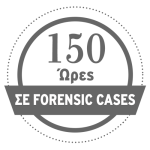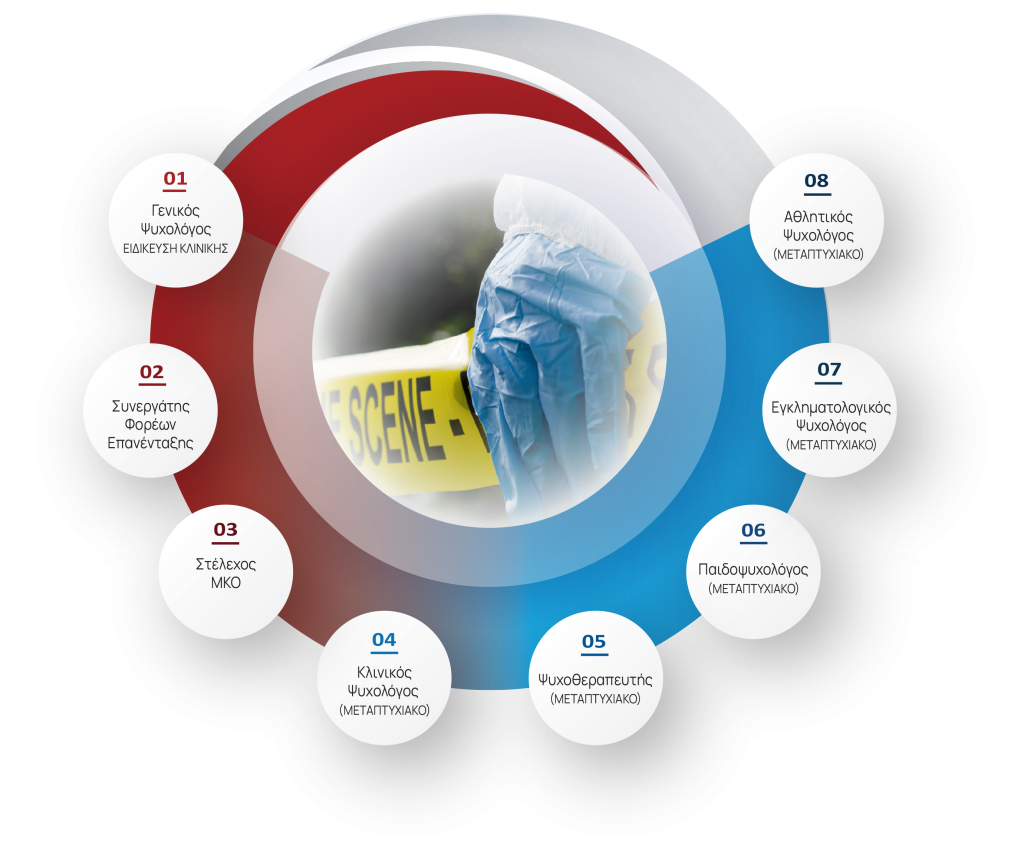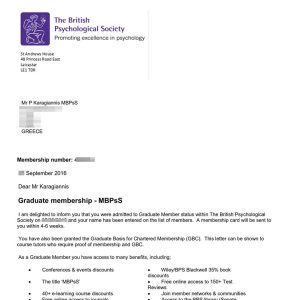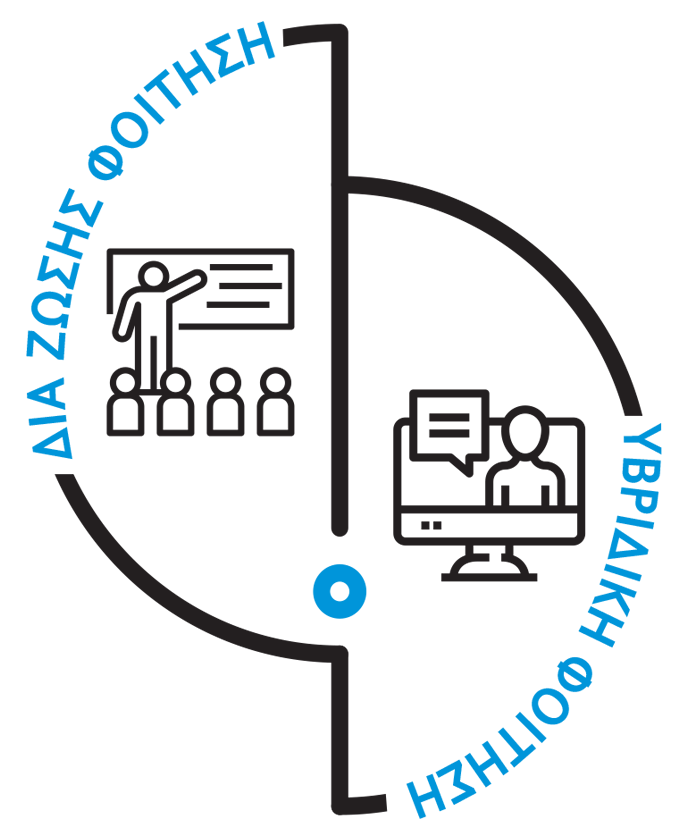Το Bachelor Εγκληματολογικής Ψυχολογίας προσφέρεται σε συνεργασία με τη Σχολή Ψυχολογίας και Ανθρωπιστικών Επιστημών του Πανεπιστημίου του Central Lancashire, του μεγάλου διεθνούς Πανεπιστημίου του Βορρά της Αγγλίας. Είναι το πρώτο προπτυχιακό εξειδίκευσης στον τομέα της Ψυχολογίας που φέραμε το 2018 στην Ελλάδα. Το πτυχίο αυτό εντάσσει τον εκπαιδευόμενο στον σαγηνευτικό κόσμο της εγκληματολογικής και δικαστικής ψυχολογίας. Συγχρόνως σας χορηγεί εξειδίκευση από το πρώτο πτυχίο καθώς και διεθνή αναγνώριση.
Bachelor Εγκληματολογικής Ψυχολογίας
Το Bachelor Εγκληματολογικής Ψυχολογίας είναι ένα πρωτοπόρο πτυχίο, το οποίο συνδυάζει τα κύρια σημεία ενδιαφέροντος όσων σκοπεύουν να σπουδάσουν Ψυχολογία και παραβατικότητα. Ο συνδυασμός αυτός, καλύπτει κομβικές ανάγκες κάθε μελλοντικού επαγγελματία που θέλει να διαπρέψει στην αγορά εργασίας. Όσο το έγκλημα και η παραβατικότητα λαμβάνουν διαρκώς νέες διαστάσεις και μορφές, τόσο μεγαλύτερη γίνεται η ανάγκη των ψυχολόγων για εξειδίκευση σε θέματα παραβατικότητας. Συχρόνως, διευρύνονται διαρκώς οι φορείς στην Ελλάδα που έχουν ανάγκη τις υπηρεσίες εξειδικευμένων εγκληματολογικών ψυχολόγων .
Εάν, λοιπόν, σας ενδιαφέρει ο τρόπος με τον οποίο λειτουργεί ο ανθρώπινος εγκέφαλος και η ανθρώπινη συμπεριφορά, καθώς επίσης, η εξήγηση της παραβατικότητας και οι αιτίες πίσω από τα συνηθέστερα εγκλήματα, τότε το Πρόγραμμα αυτό είναι ιδανικό για εσάς. Θα αποφοιτήσετε με εξαιρετικές δεξιότητες στην παρατήρηση, ανάλυση, κριτική σκέψη και διαχείριση ανθρώπων και δεδομένων. Τα στοιχεία αυτά αναζητούν ιδιαίτερα οι εργοδότες.
Τα κύρια χαρακτηριστικά του προγράμματος είναι:
- Αναγνωρισμένο από το Αυτοτελές Τμήμα Εφαρμογής της Ευρωπαϊκής Νομοθεσίας (ΑΤΕΕΝ) (πρώην ΣΑΕΠ) ως Ισοδύναμο (Επαγγελματική Ισοδυναμία) των πτυχίων Ψυχολογίας των δημοσίων ΑΕΙ.
- Έκδοση Άδειας Άσκησης Επαγγέλματος Ψυχολόγου στην Ελλάδα.
- Απόκτηση Πτυχίου Ψυχολογίας με εξειδίκευση στην Εγκληματολογική Ψυχολογία
- Δυνατότητα εγγραφής στον σπουδαιότερο σχετικό Ευρωπαϊκό Σύλλογο, τον Βρετανικό Σύλλογο Ψυχολόγων (υπό τη διαδικασία του Individual Basis).
- Δυνατότητα εγγραφής στον Σύλλογο Ελλήνων Ψυχολόγων (ΣΕΨ) (κατόπιν της απόκτησης Μεταπτυχιακού Διπλώματος σε αντικείμενο Ψυχολογίας).
- 150 ώρες εκπαίδευσης σε ζητήματα και περιστατικά εγκληματολογίας και εγκληματολογικής ψυχολογίας, μέσω του εξειδικευμένου “Forensic Days” που προσφέρουμε κάθε έτος ειδικά για τους φοιτητές των προγραμμάτων Εγκληματολογικής και Δικαστικής Ψυχολογίας του Κολλεγίου.
- Εξασφαλισμένη συνέχιση των σπουδών σε Μεταπτυχιακά Προγράμματα Σπουδών Πανεπιστημίων του εξωτερικού ή και στα Μεταπτυχιακά που προσφέρει το ICPS στην Ελλάδα.
- Εξασφαλισμένη πρακτική άσκηση, τουλάχιστον 200 ωρών, σε φορείς του ιδιωτικού και του ευρύτερου δημόσιου τομέα, σύμφωνα με τις προβλέψεις της νομοθεσίας (ν.4763/2020, ν.5006/2022).
- Εξειδικευμένα μαθήματα και πρακτικές γνώσεις σε τομείς εφαρμοσμένης ψυχολογίας και ειδικά στην εγκληματολογική ψυχολογία.
- Μαθήματα με στόχο τη διαμόρφωση της επαγγελματικής ταυτότητας των σπουδαστών, ήδη από το πρώτο έτος σπουδών.
- Ομάδα καθηγητών με μεγάλη επαγγελματική εμπειρία στα αντικείμενα διδασκαλίας τους, αλλά και με υψηλού επιπέδου σπουδές και ερευνητική δραστηριότητα.
Κριτήρια Εγγραφής
- Απολυτήριο Λυκείου.
- Καλή γνώση Αγγλικής γλώσσας είναι επιθυμητή. Θα σπουδάσετε στα Ελληνικά, αλλά η γνώση της αγγλικής είναι βοηθητική για τη μελέτη της βιβλιογραφίας.
- Καλό βαθμό απολυτηρίου Λυκείου.
- Αξιολόγηση πρόθεσης σπουδών από Σύμβουλο Σπουδών
- Επιτυχημένη ακαδημαϊκή Συνέντευξη, εφόσον ο Σύμβουλος Σπουδών το κρίνει απαραίτητο.










 Εγγραφή αποφοίτου στο Βρετανικό Σύλλογο Ψυχολόγων,
Εγγραφή αποφοίτου στο Βρετανικό Σύλλογο Ψυχολόγων,



























